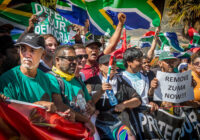Above-board corporate behavior in the UK does not guarantee ethical conduct elsewhere.
In its annual Good Governance report, the Institute of Directors (IoD) assesses the United Kingdom’s largest listed companies against indicators that include board effectiveness, audit and risk accountability, remuneration, shareholder relations and stakeholder relations. Ironically, the IoD index’s top performers often come from the alcohol and tobacco industries. This year’s report gave pride of place to the distiller Diageo and the 2016 winner was British American Tobacco (BAT).
The IoD’s standards may be appropriate for how these companies behave in London. In Kinshasa, Kampala and Juba, though, the praise of BAT surely raises eyebrows. As the rest of the world has learned over the intervening months, above-board corporate behavior in the UK does not guarantee ethical conduct elsewhere.
BAT and the tobacco industry more broadly are cases in point. The Guardian revealed in a series of explosive investigative pieces over the summer that BAT (as well as other multinational tobacco firms) has been ruthless in staking out market share and seeing off health regulations in African markets. BAT and its allies have threatened governments in some eight African countries to counteract policies that have underpinned public health initiatives in Western markets.
The evidence is there in black and white. In letters sent to lawmakers in Uganda, Namibia, the Democratic Republic of Congo, Togo, Gabon, Ethiopia and Burkina Faso, BAT accused governments of breaching laws, international trade agreements, and causing economic damage in their attempts to implement anti-smoking regulations. The missives are reminiscent of the infamous Phillip Morris v. Uruguay court battle over “economic damages” suffered by the tobacco company because of efforts to curb smoking.
Anti-tobacco campaigners recognize many of these tactics. Before major litigation in America in the 1990s, the industry deployed the same strategy of overt and covert pressure on public officials in the United States, Europe and other parts of the “developed” world. With changing public attitudes defeating tobacco industry lobbying and bringing down smoking rates in North America and Europe, the major brands are desperate to preserve and expand a new customer base in lower- and middle-income countries, especially African ones.
The key difference here is the industry’s willingness to exploit porous borders and weak states to traffic illegal tobacco across the continent, showcasing a Wild West attitude in places where rules of “good governance” apparently don’t apply. Coming amidst claims of secret tobacco farms, bribery, exploitation of conflict zones and a general culture of corruption, the allegations put forward by a whistleblower to The Guardian have prompted a UK Serious Fraud Office investigation.
That investigation may come too late. There are rising fears that Big Tobacco will be able to dictate terms to African health ministries in the “new battlegrounds” of the global fight to stop smoking, especially after BAT completed its acquisition of Reynolds American to become the world’s biggest listed tobacco firm.
BAT is far from the only company with an anything-goes mentality in developing markets. When it first took on as a client South Africa’s Oscar Pistorius as he stood trial for murdering his girlfriend, British public relations firm Bell Pottinger was painted as a pioneer in overseas markets. In September, an independent report instigated the firm’s collapse by exposing a race-baiting campaign to protect allies of South Africa’s President Jacob Zuma. Unilever, who joined BAT at the top of the 2016 list, is dealing with its own allegations of abuse, including child labor and exploitation of women, amid a palm oil scandal that impacts its supply chain in Southeast Asia.
SIN TAXES
Given these discrepancies, it is past time that major multinationals (and the organizations giving them awards) prioritize good governance as an all-encompassing global priority, regardless of whether or not governments in the areas where they operate have the capacity to enforce local laws or (in tobacco’s case) international agreements on health policy. This means more than just playing by “the rules.” In many instances, multinationals play an outsized role in the financial stability of entire nations.
 That starts with their contributions to state coffers. Tax revenue has a direct impact on development. Taxes not only pay for basic services, but pave the way for much needed reforms, investment in vital public services and boosting human capital. The ability to fund government services with tax dollars as opposed to aid dollars is a major development milestone. In 2012, tax revenue in Sub-Saharan Africa provided ten times the $51.9 billion received in development assistance. In Rwanda, 50% growth in tax revenues by 50% between 2001 and 2013 corresponded with a doubling of government expenditures on health (as a percentage of GDP).
That starts with their contributions to state coffers. Tax revenue has a direct impact on development. Taxes not only pay for basic services, but pave the way for much needed reforms, investment in vital public services and boosting human capital. The ability to fund government services with tax dollars as opposed to aid dollars is a major development milestone. In 2012, tax revenue in Sub-Saharan Africa provided ten times the $51.9 billion received in development assistance. In Rwanda, 50% growth in tax revenues by 50% between 2001 and 2013 corresponded with a doubling of government expenditures on health (as a percentage of GDP).
Unfortunately, multinational corporations are ingeniously persistent in avoiding liabilities. Misleading invoicing, payments between subsidiaries and parent companies, and profit-shifting mechanisms are common strategies utilized to minimize and avoid taxation while maximizing profits. Taken together, corporate use of tax havens may be costing the developing world up to $100 billion per year.
As countries like Kenya roll out excise stamps and take other steps to help collect much-needed tax revenue, British and other Western multinationals must determine whether they will respect the spirit of new rules or undermine them. BAT allegedly smuggled tobacco from the DRC through Uganda and into Kenya just to avoid these duties. The Diageo-controlled East African Breweries Ltd. (EABL) is building up the Kenyan spirits industry in direct response to government taxes on beer, claiming that duties have made beer “unaffordable” despite being Kenya’s second-largest company by value.
These companies are well aware of the contributions “sin taxes” make to public coffers and public health in the developed world. By dodging or undermining those duties in Sub-Saharan Africa, they send the message that those countries do not deserve the same benefits. Is that the type of corporate outlook that makes for leadership in governance? It’s a question the IoD should consider addressing in next year’s report.
The views expressed in this article are the author’s own and do not necessarily reflect Fair Observer’s editorial policy.
Photo Credit: Pressmaster / Shutterstock.com
Support Fair Observer
We rely on your support for our independence, diversity and quality.
For more than 10 years, Fair Observer has been free, fair and independent. No billionaire owns us, no advertisers control us. We are a reader-supported nonprofit. Unlike many other publications, we keep our content free for readers regardless of where they live or whether they can afford to pay. We have no paywalls and no ads.
In the post-truth era of fake news, echo chambers and filter bubbles, we publish a plurality of perspectives from around the world. Anyone can publish with us, but everyone goes through a rigorous editorial process. So, you get fact-checked, well-reasoned content instead of noise.
We publish 2,500+ voices from 90+ countries. We also conduct education and training programs
on subjects ranging from digital media and journalism to writing and critical thinking. This
doesn’t come cheap. Servers, editors, trainers and web developers cost
money.
Please consider supporting us on a regular basis as a recurring donor or a
sustaining member.
Will you support FO’s journalism?
We rely on your support for our independence, diversity and quality.






